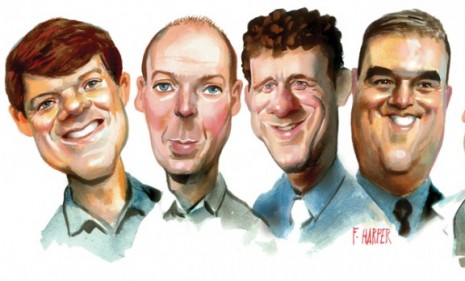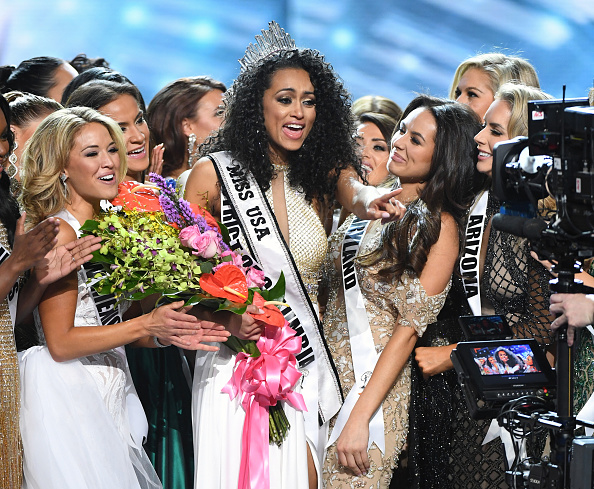John Sides and The Monkey Cage: Blogger of The Year
Meet the winner of The Week's Blogger of the Year award

A free daily email with the biggest news stories of the day – and the best features from TheWeek.com
You are now subscribed
Your newsletter sign-up was successful
The Politico’s Politico
Nate Silver became a superstar during the 2008 election by bringing serious statistical rigor to the horse-race coverage of presidential polling. John Sides, co-founder and driving spirit of The Monkey Cage, is doing the same thing for voter behavior, injecting the wisdom of the academy into everyday political discourse.
When Sides helped launch the blog in 2007, the goal was to publicize political science research by posting links to articles and other academic works that intrigued him, along with his reactions. But Sides, an assistant professor of political science at George Washington University, has a knack for connecting his observations to real-world political problems, in real time.
The Week
Escape your echo chamber. Get the facts behind the news, plus analysis from multiple perspectives.

Sign up for The Week's Free Newsletters
From our morning news briefing to a weekly Good News Newsletter, get the best of The Week delivered directly to your inbox.
From our morning news briefing to a weekly Good News Newsletter, get the best of The Week delivered directly to your inbox.
“If John Sides and his co-authors weren’t there to bring high-quality, relevant, up-to-date political science to the attention of the wider world, no one would be doing it,” says Ezra Klein, who blogs for The Washington Post and won last year’s Blogger of the Year award. “Before they came along, no one was doing it. Political scientists were publishing for one another, political journalists were either replicating their work or writing things that had already been disproven by it, and both sides were poorer for it.”
Sides’s academic research centers on mass political behavior, including such topics as the effects of campaigns on voters, the impact of turnout on election outcomes, and the effects (or lack thereof) of factual information on public opinion. In addition to The Monkey Cage, he has written for Salon, the Los Angeles Times, The Wall Street Journal’s Ideas Market blog, and the New York Daily News. This spring he will become a contributor to Behind the Numbers, The Washington Post’s polling blog.
His co-authors at The Monkey Cage are Andrew Gelman, professor of statistics and political science at Columbia; Joshua A. Tucker, associate professor of politics at New York University; Erik Voeten, associate professor of geopolitics and justice in world affairs at Georgetown University; and Henry Farrell, associate professor of political science and international affairs at George Washington University.
Sides and his dogged band of social scientists pipe up, in clear, concise, and witty posts, whenever the political debate strays too far from the evidence. In one post, Sides looks past journalists’ sentimental musings about whether Barack Obama can restore our faith in America’s institutions to consider the research data on the topic. His conclusion: It’s the economy, stupid. “People trust the government when times are good,” he writes. “They don’t trust it when times are bad.” As usual, he bolsters his case with sharp graphics. In another post, he examines why so many Americans say they’d cut foreign aid, a relatively tiny expenditure, in an effort to balance the budget. Again his research-driven conclusion sounds simple: Americans really like big entitlement programs; that’s how they got big in the first place.
A free daily email with the biggest news stories of the day – and the best features from TheWeek.com
After considering a rich field of nominees for Blogger of the Year, the judges felt Sides had not only developed a new template for bloggers but also shown a certain bravery by asserting the right of academics to blog at a time when others have seen their university careers suffer for doing so. The Monkey Cage is an invaluable resource not just for academics and political journalists but for all political junkies.
Read excerpts from The Monkey Cage on the next page.
Excerpts from The Monkey Cage:
It’s not special interests and partisanship that have made Americans lose their faith in government. In fact, nothing has been permanently lost: Over the past 30 years, Americans have gained, lost, regained, and “relost” faith in government.
"What will make people trust government again?" Feb. 14, 2010
I learn today—belatedly—that Michelle Obama took a trip to Spain with her daughter. This is apparently controversial.…
Let me be clear. It does not matter where presidents or their wives go on vacation. IT DOES NOT MATTER. Presidential approval, election outcomes, support in Congress—nothing that does matter depends on where presidents go on vacation. It did not matter when Clinton apparently polled to figure out where he should go. It did not matter when Bush decamped to Crawford. It did not matter when the Obamas went to Martha’s Vineyard. It does not matter now.
[Maureen] Dowd writes: “In politics and pop culture, optics are all.” By that she means, “In politics and pop culture, optics are all that matters to me.” You could not ask for a better distillation of why so much political commentary is so completely and utterly detached from what actually affects political outcomes. War and peace, economic prosperity and hard times, real scandals—these things pale beside the fact that the Obamas once went to New York City on a date!
"Presidential vacations: A Sunday morning rant, targeted mainly at Maureen Dowd," Aug. 8, 2010
Back when pundits were tripping over themselves to call 2010 an “anti-incumbent” year or an “anti-Establishment” year, conveniently eliding the distinction as it served their purposes, I wrote: “I would be very surprised if any ‘anti-incumbent fervor’ put much dent in the extraordinarily high rates at which incumbents are re-elected.” And then I forecast that among House incumbents running for the general election, 87 percent would win. Commenter Treetop noted last week that my prediction was good. Our data suggest at this moment that 86 percent of House incumbents won their general election bids.
"2010 was a pretty good year for incumbents after all," Nov. 10, 2010
-
 The Olympic timekeepers keeping the Games on track
The Olympic timekeepers keeping the Games on trackUnder the Radar Swiss watchmaking giant Omega has been at the finish line of every Olympic Games for nearly 100 years
-
 Will increasing tensions with Iran boil over into war?
Will increasing tensions with Iran boil over into war?Today’s Big Question President Donald Trump has recently been threatening the country
-
 Corruption: The spy sheikh and the president
Corruption: The spy sheikh and the presidentFeature Trump is at the center of another scandal
-
 Catriona Gray of the Philippines named Miss Universe
Catriona Gray of the Philippines named Miss UniverseSpeed Read
-
 Miss District of Columbia named 2017's Miss USA
Miss District of Columbia named 2017's Miss USASpeed Read
-
 Rumor becomes second German shepherd to win the Westminster dog show
Rumor becomes second German shepherd to win the Westminster dog showSpeed Read
-
Issue of the week: Yahoo’s ban on working from home
feature There’s a “painful irony” in Yahoo’s decision to make all its employees come to the office to work.
-
Issue of the week: Another big airline merger
feature The merger of American Airlines and US Airways will be the fourth between major U.S. airlines in five years.
-
Issue of the week: Feds’ fraud suit against S&P
feature The Justice Department charged S&P with defrauding investors by issuing mortgage security ratings it knew to be misleading.
-
Issue of the week: Why investors are worried about Apple
feature Some investors worry that the company lacks the “passion and innovation that made it so extraordinary for so long.”
-
Issue of the week: Does Google play fair?
feature The Federal Trade Commission cleared Google of accusations that it skews search results to its favor.